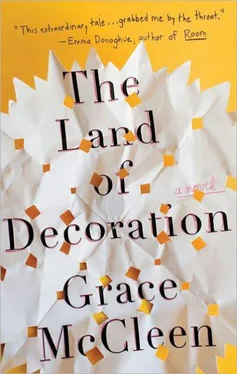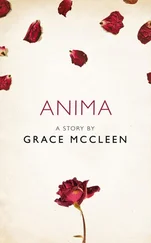Father told me to go inside, but I was feeling sick and wanted to see him in front of me, so I carried on handing him wood. I was cold though. “Isn’t it high enough now?” I said at last.
“ High enough?”
“We can’t see the street anymore.”
“Not high enough by half!” he said, and hurled the cement at the board as if he was teaching it a lesson.
Not long after that, I was handing Father a plank when a splinter went into my hand. Father didn’t see. I tried to pull it out but it broke off, and after that it hurt whenever I passed him anything. It was quite dark then and Father rigged up the Tilley lantern on top of the planks and carried on working, tottering on top of another two milk crates. He asked me to go and fetch the carrier bags of glass for the bottle bank, and when I did, he jumped on them and stuck the broken pieces in the cement along the top of the wall and in the gaps between the wood where the cement was fresh along the outside. At nine o’clock, we went inside. Father’s face was red, and around his eyes there were two white rings. He poured tea in the kitchen and his hand shook. He said the only thing left to do now was make a new gate and he would do that tomorrow.
We ate dinner in silence. It hurt to hold the fork. I didn’t feel like eating anyway. Suddenly I said: “You forgot to say thanks.”
Father stopped eating. Then he swallowed with a gulp and reached for his cup of tea. “Well, it’s too late now,” he said.
I stared at him. He cleared the last of his plate with a clatter, pushed back his chair, and said: “Is this finished?” I didn’t answer, but he took my plate anyway and went to the sink.
“What’s the matter with you?” he said as we were washing up.
“Nothing.”
“Yes there is. Come on, out with it.” Then he stopped rinsing the dishes and said sharply: “What’s the matter with your hand?”
“Nothing.”
He took the plate I was drying and opened my palm. The skin around the splinter was red and raised. When he touched it, I jumped.
“Why didn’t you tell me?” he said, in a different voice altogether, and I shrugged and looked away.
Father turned off the tap. He told me to sit down and went out of the room. When he came back in he had antiseptic, cotton, a tin of Band-Aids, and a needle. He pulled up a chair and sat opposite me and took my hand and began stroking the splinter with the needle.
Father’s face seemed to be completely empty now. I could feel his breath on my hand. He was gentle so it didn’t hurt, but my eyes got full anyway and I couldn’t look up.
He took a bandage and peeled off the back and pressed it down around the cut. “By there,” I said, and he pressed it. “And there.” He pressed the Band-Aid some more. All around us, the room had become very still.
Then he stood up as if he’d suddenly remembered something and said: “That should do it.”
I said: “Do you think I need it wrapped?”
The darkness came back into his face. He said: “It’s a splinter, Judith.”
I put my hand over the Band-Aid and watched him go.
WE DIDN’T GO to the meeting the next day, so I didn’t have to decide whether to wear Josie’s poncho or not. We didn’t go preaching or read the Bible or eat roast lamb and bitter greens. Instead, Father made a gate.
I have never seen a gate like it, and I don’t think anyone else had either judging from their faces as they walked by. Father worked on it all day in the front garden. There was ice on the ground and it didn’t melt, because there was no sun. I took cups of tea out to him, but he told me to stay inside because it was so cold.
At ten to two Uncle Stan phoned to find out if we were all right. I thought it was strange Father hadn’t phoned him or Alf before now to tell them about the fire, but I didn’t like to ask why. I told Uncle Stan that Father was making a gate. He said: “Oh…” Then he said: “Well, as long as you’re both all right … not ill or anything.”
“No,” I said. “Would you like me to get Father for you?”
“Is he busy?”
Father tottered past the window with the gate. “A bit,” I said.
Stan said: “Well, don’t bother him, pet.” Then he said: “A gate?”
“Yes.”
“Well, just let him know I phoned to say we missed you.”
“All right.”
I felt strange when I put the phone down. Uncle Stan’s voice seemed to be coming from another world. I suddenly wished we had gone to the meeting. I wouldn’t even have minded wearing the poncho.
When Father had finished the gate, it was taller than him and shaped like a church window. It was three planks thick, with metal studs in the front and right in the middle a brass knob that was as big as a hand and shaped like a spike. It took Father an hour to hang it, and the sweat ran down his face and he made a noise as if he were in agony. Afterward, he showed me how to unlock it and gave me a key. The key was longer than my hand and very heavy.
At dinner I said: “Uncle Stan phoned.”
“Oh.”
“He wondered if we were ill.”
“What did you tell him?”
“That you were making a gate. He said to tell you they missed us.” I took the plates to the sink and said: “Shall I get the Bibles?”
Father put his head in his hands. “In a minute.”
I hadn’t noticed his hands till now. They looked twice their normal size and were bright red, as if they’d been plunged into boiling water. There were cuts and dried blood and pieces of skin peeled back. His fingers looked like sausages about to burst out of their skins.
I washed and dried the dishes and fetched the Bibles. But when I came back, Father’s head was on his arms and he was fast asleep.
ON MONDAY, NEIL Lewis wasn’t in school and I was glad. Mrs. Pierce didn’t seem to know about the fire and no one else did either, so if Lee and Gareth had been with Neil they hadn’t told anyone.
When I went home, I saw Mr. and Mrs. Neasdon, Mrs. Andrews, and Mr. Evans standing on the corner of our road with bags of shopping. Mrs. Neasdon was saying: “We’ve got to live next door to that.”
Mr. Evans said: “I can understand why he’s done it, but you don’t go and do that. I mean, look at that glass.”
Mrs. Andrews said in a low voice: “If you ask me, I think he’s losing it.”
Mr. Neasdon shook his head. “He lost it long ago.”
They stopped talking when they saw me, and Mrs. Neasdon smiled a wobbly smile. I didn’t smile back. I heard her say when I had passed: “And God knows that child gets stranger every day.”
I felt itchy as I walked to the house. I went through the gate and locked it behind me. I peered through a crack in the fence. The itching got worse. Then I picked up a small stone and climbed the cherry tree. I flung the stone as hard as I could over the top of the fence, then dropped to the ground. When I looked through the crack, they had all stopped talking and were looking at the house.
I waited till they began to talk again, then got another stone, climbed up the blackened cherry tree, and threw it as hard as I could. It caught Mr. Neasdon on the neck, and he saw me before I could jump clear. Through the fence I saw him stare at our house. Mrs. Neasdon put her hand on his arm. They went indoors.
I felt hot after they had gone and sat with my back against the fence, digging my shoes into the earth. I didn’t go inside until the bus came with Father on it, though it was dark by then and I was shivering.
“What are you doing out here?” he said.
* * *
AT DINNER I said: “Mr. Neasdon said how much he liked the fence.”
Читать дальше












